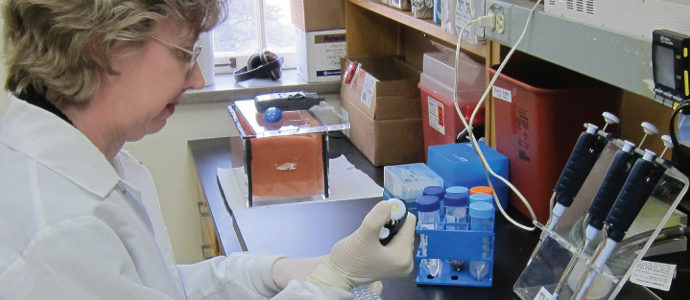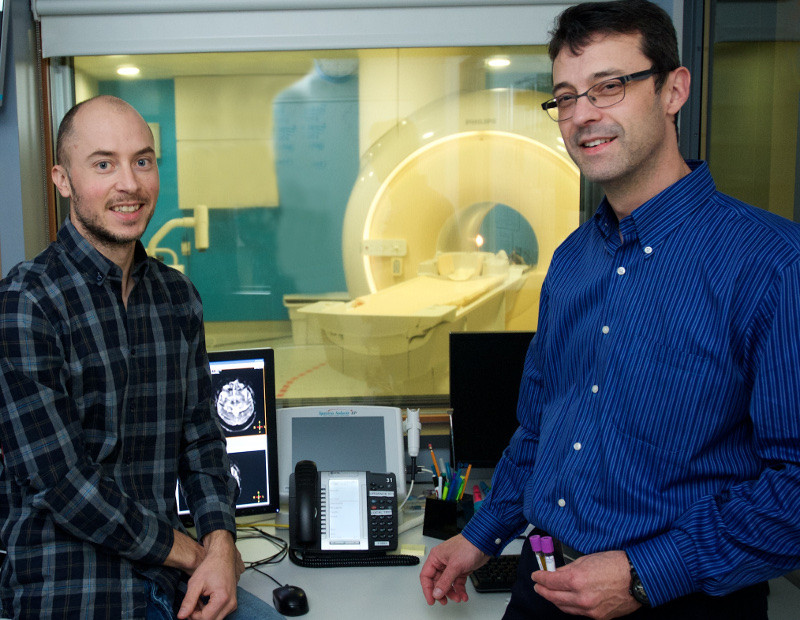With a $66,714 grant from the FRAXA Research Foundation awarded over 2015-2017, Dr. Francois Corbin at the Universite of Sherbrooke will test the safety and synergistic effects of lovastatin and minocycline in patients with Fragile X syndrome.
Read more2012 Grants
FRAXA Drug Validation Initiative (FRAXA-DVI)

The FRAXA Drug Validation Initiative (FRAXA-DVI) provides speedy, cost-effective, objective preclinical testing of potential Fragile X treatments. FRAXA-DVI uses in-vitro systems, behavior batteries, and gene expression and peripheral biomarker platforms to validate investigational new drugs and repurposed available compounds in Fragile X syndrome (FXS).
Read moreDefining Subcellular Specificity of Metabotropic Glutamate Receptor (mGluR5) Antagonists

With $217,500 in grants from FRAXA Research Foundation, Dr. Karen O’Malley and team studied the function of mGluR5 when it is inside cells. Many of the symptoms of Fragile X Syndrome (FXS) are thought to arise due to overactive metabotropic glutamate receptor 5 (mGluR5) signaling, which is normally opposed by the protein missing in FXS, Fragile X Protein (FMRP).
Read morePIKE as a Central Regulator of Synaptic Dysfunction in Fragile X Syndrome

With $255,000 from FRAXA Research Foundation, Dr. Suzanne Zukin at Albert Einstein College of Medicine studied signalling pathways in Fragile X syndrome.
Read moreSensory Hypersensibility in Fragile X Syndrome and BK Channel Openers

With $366,100 in grants from FRAXA Research Foundation, these investigators at the University of Orleans studied sensory abnormalities in Fragile X mice and test the ability of a class of drugs, BK channel openers, to rescue these abnormalities.
Read moreFragile X Mutant Mouse Models

With $375,000 in grants from the FRAXA Research Foundation since 2009, Dr. David Nelson has developed an impressive array of advanced mouse models of Fragile X, at Baylor College of Medicine. These models are available to investigators worldwide on request. This resource has been essential for a broad, rapid distribution of Fragile X and related gene mouse models and has increased the pace of Fragile X research.
Read moreFruit Flies to Model and Test Fragile X Treatments

Dr. Jongens and his collaborators have found an insulin-like protein in the fly brain that is overexpressed in the Fragile X mutant fly, leading to increased activity of the insulin signaling pathway. Furthermore, they found that certain behavioral patterns in the Fragile X flies can be rescued by expressing the FX gene just in insulin producing neurons in the fly brain. In the mutant, there are other changes in the signaling pathways, including a decrease in cAMP and elevation in PI3K, mTOR, Akt and ERK activity. They now propose to study 2 medicines used for diabetes: pioglitazone (increases cAMP and decreases Akt and ERK) and metformin (inhibits mTOR), in flies and mice to validate the potential efficacy of these novel therapeutics for Fragile X.
Read moreThe Endocannabinoid System in a Mouse Model of Fragile X Syndrome

With a $128,500 grant over 2011-2013 from FRAXA Research Foundation, Drs. Bradley Alger and Ai-Hui Tang at the University of Maryland researched endocannabinoid pathways in Fragile X.
Read morePhase 1 Clinical Trial of Mega Green Tea Extract in Fragile X Syndrome

With a $124,000 grant from the FRAXA Research Foundation from 2012-2014, Dr. Mara Dierssen and Dr. Rafael de la Torre conducted preclinical studies in Fragile X knockout mice and a clinical trial in Fragile X patients using Mega Green Tea Extract, which contains 45% by weight epigallocatechin gallate (EGCG).
Read moreFunctional Interplay Between FMRP and CDK5 Signaling
With a $180,000 grant from the FRAXA Research Foundation over 2011-2014, Dr. Yue Feng and Dr. Wenqi Li at Emory University will study CDK5 pathway function and regulation in an effort to break down whether and how CDK5 signaling is affected by the loss of the Fragile X protein, FMRP, in the Fragile X mouse model.
Read moreSmall Molecules To Target r(CGG) Expansions to Treat Fragile X Syndrome

With a 2-year, $90,000 grant from FRAXA Research Foundation, Dr.’s Matthew Disney and Wang-Yong Yang worked to correct the underlying problem in Fragile X: the silencing of the Fragile X gene (FMR1) and the resulting lack of FMRP (Fragile X Mental Retardation Protein). Their approach was to use novel small molecules to target the abnormal CGG repeats before the FMR1 gene.
Read morePotassium Channel Modulators to Treat Fragile X

With $246,000 in funding from FRAXA over 2012-2014, the Yale University team of Leonard Kaczmarek, PhD, showed that loss of FMRP leads to an increased Kv3.1 potassium currents and decreased Slack potassium currents in neurons. Both of these changes impair timing of action potentials in auditory neurons (and likely others throughout the brain). The team also found that the firing pattern of neurons in response to repeated stimulation is severely abnormal in Fragile X mice. Based on these results, they are collaborating with the UK-based company Autifony to develop and test advanced compounds which may reverse these deficits.
Read moreSocial Behavior as an Outcome Measure for Fragile X Clinical Trials

One of the features of the Fragile X mouse model which is relevant to the human Fragile X syndrome (and autism) is social behavior. Several tests show consistent social behavioral abnormalities in the Fragile X mouse model. With a $140,000 grant from FRAXA Research Foundation in 2012-2013, Dr. Willemsen at Erasmus University used social behavior tests to measure the effectiveness of several drug strategies.
Read moreTranslation-Independent Functions of FMRP in Excitability, Synaptic Transmission and Plasticity

With a $140,000 grant from FRAXA Research Foundation, Dr. Vitaly Klyachko and team at Washington University explored STP (short-term plasticity) in Fragile X, namely looking at presynaptic calcium dynamics as a major underlying cause of the STP defects.
Read moreGlycogen Synthase Kinase-3 (GSK3), Lithium and Fragile X

With $208,000 in funds from FRAXA Research Foundation, Dr. Richard Jope and his team at the University of Miami tested whether newly developed, highly specific inhibitors of GSK3 can reduce behavioral abnormalities in Fragile X mice.
Read moreThe mTOR Pathway in Fragile X Syndrome
With a $90,000 grant from FRAXA Research Foundation over 2012-2013, Dr. Eric Klann and Postdoctoral Fellow Dr. Aditi Bhattacharrya of New York University investigated alterations in the mTOR pathway in Fragile X syndrome – which is also known to be defective in several forms of autism. Their work was published in September 2012 and received international attention.
Read moreMatrix Metalloproteinase Therapeutic Treatments for Fragile X Syndrome

With a $157,000 grant from the FRAXA Research Foundation in 2012-2013, Dr. Kendal Broadie and Dr. Cheryl Gatto worked to define the distinct but also overlapping roles for MMP-1 and MMP-2 in synaptic structural and functional development. In drug studies with Fragile X fruit flies, they will be testing a range of MMPIs in drug treatments to compare effectiveness during development and at maturity, in order to define the contributions of FXS developmental impairments and adult recovery/plasticity.
Read moreEffects of minocycline on vocal production and auditory processing in a mouse model of Fragile X

With $135,000 in grants from FRAXA Research Foundation over several years, Dr. Khaleel Razak and Dr. Iryna Ethell explored robust biomarkers relevant to the FXS and the efficacy of minocycline treatment.
Read moreEndocannabinoid Mediated Synaptic Plasticity in Fragile X Mice

With a $90,000 grant from FRAXA Research Foundation over two years, Drs. Olivier Manzoni and Daniela Neuhofer researched the relationship between Fragile X syndrome and the areas of the brain that are involved in reward processing, regulation of emotional behavior and emotional memory as well as attention, planning and working memory.
Read moreDeveloping IPS cells to Screen Drugs which can Reactivate the FMR1 Gene

With $146,000 grant from FRAXA Research Foundation over 2012-2013, Drs. Anita Bhattacharyya and Xinyu Zhao at the University of Wisconsin developed a new mouse model of Fragile X syndrome which will enable testing of gene reactivation and gene therapy approaches to treatment. They transplanted human Fragile X neural cells differentiated from induced pluripotent stem cells into brains of neonatal mice and then testing for FMR1 reactivation. In 2015, The John Merck Fund assumed support for this work with a generous grant of $750,000 to the scientists. Results published.
Read moreSmall Rho GTPases, a Potential Therapeutic Target for Fragile X Syndrome

With $384,345 in grants from FRAXA Research Foundation, Dr. MariVi Tejada from the University of Houston focused on a particularly promising point of intervention in pathways of brain receptors, and tested several potential therapeutic compounds in an attempt to rescue function in the mouse model of Fragile X.
Read moreEvaluation of CamKII Dependent Regulation of mGluR5-Homer Scaffolds as a Potential Therapeutic for Fragile X Syndrome

With a $90,000 grant from FRAXA Research Foundation, Dr. Kimberly Huber and Dr. Weirui Guo at the University of Texas at Southwestern investigated the roles of Homer and CaMKII in Fragile X syndrome.
Read moreAb-Mediated Translation in Fragile X Syndrome

With a $120,000 grant from FRAXA Research Foundation during 2011-2012, Dr. Cara Westmark at the University of Wisconsin explored the role of AbPP as a potential treatment option for fragile X. AbPP produces b-amyloid which is over-expressed in Alzheimer’s disease (AD) and Down syndrome.
Read moreSynaptic Actin Signaling Pathways in Fragile X

With a $163,356 grant from FRAXA Research Foundation in 2010-12, Dr. Scott Soderling and Dr. Hwan Kim at Duke University bred the standard mouse model of Fragile X syndrome to their lines of mice that express reduced levels of several key proteins that modulate synaptic actin. These compound mutant mice were compared to FXS mice to determine if genetically impairing pathways to the actin cytoskeleton can rescue deficits in the FXS mice.
Read moreGenetic and Pharmacologic Manipulation of PI3K Activity in FXS: Assessing Potential Therapeutic Value

With a $90,000 grant from the FRAXA Research Foundation, Dr. Gary Bassell and his team at Emory University explored the PI3K/mTOR signaling complex in FXS via genetic and pharmacologic rescue approaches, to reduce the enzymatic function of specific components of this complex pathway in an FXS mouse model.
Read more
